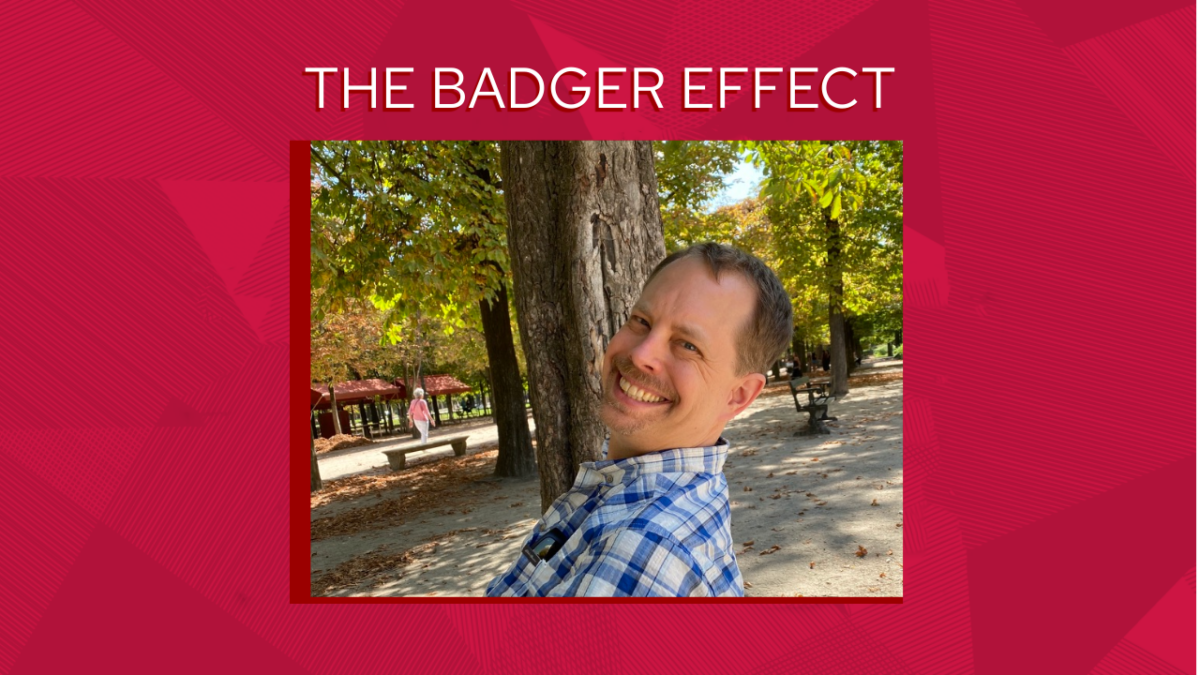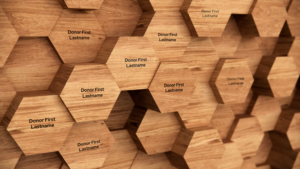
“Shipping is a feature.”
The phrase is commonly used among software engineers. And to UW–Madison alumnus Erik Jacobsen ’97, it is the best advice he can give to future software engineers.
“There is always a temptation when developing software to try to make it perfect and put one more thing in prior to shipping it, but you can’t let perfect be the enemy of good enough,” says Jacobsen.
The phrase emphasizes the iterative nature of software development.
“Software development is a continuous process, and it is better to improve things in frequent small increments so users can benefit immediately, rather than releasing infrequently with large changes,” says Jacobsen.

Thanks to Jacobsen’s generosity, the phrase will grace a donor wall in Morgridge Hall, the new School of Computer, Data & Information Sciences building. Jacobsen is part of The Badger Effect, a fundraising campaign highlighting the impact of collective giving. Through their contribution, donors can personalize tiles on a unique donor wall that visually represents the ripple effect Badgers have when they come together.
Thousands of Badgers will walk past the inscription in the new building, serving as a reminder to embrace good enough right now, instead of striving for perfection at an undefined date.
Jacobsen has spent decades developing software, both professionally and personally. He has been interested in computers since 1984, when his mother, the first tenure-track female professor in the history department at UW–Madison, brought home an original IBM PC to help with her research.
He spent a significant amount of time playing with the computer and eventually started writing software. An interest turned into a job at the age of 16 when he helped a statistics professor with telephone interviewing software.
“I became fascinated with the machine and enthralled with the idea that I could make it do useful things,” says Jacobsen.
Jacobsen eventually chose to study Computer Sciences and Electrical & Computer Engineering at UW–Madison. He recalls the hard work that came along with his majors.
“I had a very different experience than what my mom saw as a history professor. She said she didn’t know that undergrads could work that hard when she saw what we were doing in engineering,” says Jacobsen. “At the time, your personal computer was not powerful enough to run the software we needed for our classes, so we had to be in the lab. We would work all night and even sleep in the labs in the engineering building.”
During his time at UW–Madison, he had the opportunity to intern for Microsoft in Seattle. He was able to get experience working for a large software company and was with the company for the release of Windows 95.
The following summer he had the option to go back to Microsoft but chose to work at a small company started by UW–Madison civil engineering professor Alain Peyrot that wrote software for the utility industry.
After graduation, he received offers from both companies and chose to work for Power Line Systems, the smaller company founded by Alain Peyrot where he could make more of an impact. He started with the company as employee number one.
“We weren’t big enough to have dedicated technical support, so developers had to talk to clients. Talking to users is surprisingly rare in the software industry, but remarkably helpful in learning how to make usable software that benefits them,” says Jacobsen. “Further, having to explain your bugs to users emphasizes the importance of quality.”

Jacobsen has carried this emphasis on quality and doing the most good throughout his career, sharing the sentiment with coworkers and mentees. It is also what drew him to inscribing the phrase “shipping is a feature” on a tile.
“I felt like putting my name on a tile did not do much to help passersby. ‘Shipping is a feature’ has been extraordinarily helpful for me in terms of developing quality software. Hopefully, a few students will see this phrase, be curious, and read a little bit about that philosophy of software development” says Jacobsen.
Jacobsen’s desire to make things better doesn’t stop at software development. After his mother, UW-Madison professor Diane Lindstrom, was diagnosed with ovarian cancer, he wanted to improve health outcomes for women diagnosed with gynecologic cancers.
“I saw the amazing dedication and care provided by the folks at UW Hospital, and I also saw the enormous disparity in resources that are afforded to gynecologic oncology versus other forms of cancer, especially given the number of women who suffer from it and how incredibly poor their prognosis is,” says Jacobsen.
Throughout his mother’s cancer treatment, Jacobsen witnessed firsthand the lack of clinical trials available at the university at the time. While he was able to drive his mother to Chicago for a trial, he recognized that not everyone was able to do the same.
“You should not suffer because you don’t happen to have a research hospital in your backyard, or someone who can drive you to a research hospital,” says Jacobsen. “So, one of the things that interested me was what could we do to increase clinical trial availability here so that more folks have an opportunity after exhausting the standard lines of treatment. We also need a lot more basic science so we can understand what makes ovarian cancer develop and spread.”
In January 2019 he endowed The Diane Lindstrom Ovarian Cancer Research Fund to support the brilliant and dedicated researchers who are trying to detect, treat and prevent ovarian cancer. The fund works by providing the initial seed funding required to start a project and obtain enough data to write a grant proposal.
Much of his desire for continuous improvement stems from his appreciation for the university.
“We are incredibly fortunate to have the university. It’s an amazing asset for Wisconsin due to the talented faculty and staff who are devoted to improving life for all of us,” says Jacobsen.